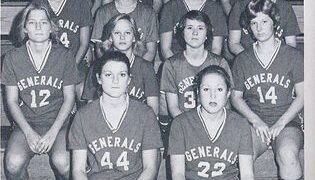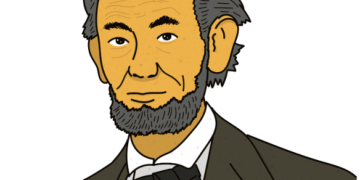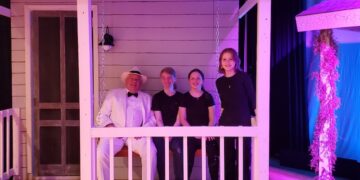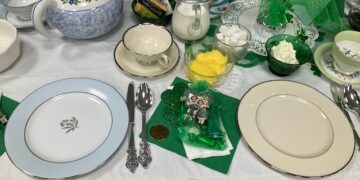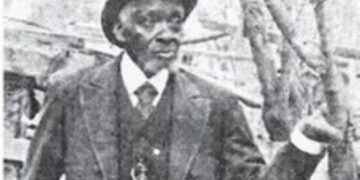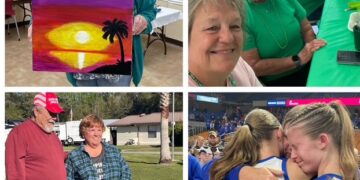Inheritances often increase disagreements between siblings, and when there is a second marriage and second set of children, disagreements can intensify.
That’s what happened in the Jacob Fawley family. He was born in 1802 in Loudoun County, VA and moved to Brocks Gap when he was a child. Jacob’s home was the log house next to my homeplace.
His story has always interested me. Why? First, his home was the site of Fort Hogg, used during the French and Indian War about 50 years before the Fawleys moved to Rockingham County. Second, I knew lots of Fawleys, like David, Wade, Joe, and Rose Fawley Mitchell. They told me that Jacob was their great-grandfather. I also knew one of Jacob’s daughters, Fannie Fawley Shickle. Now how could I personally know someone whose father was born in 1802? It was because Fannie was the youngest child of Jacob’s second marriage, born when Jacob was 76 years old. You may have heard of another of his daughters, Lizzie Custer who ran a store near Genoa School.
Jacob Fawley and his first wife Sarah Minnick had six children. Sarah died in 1853. In 1860, Jacob (age 58) married Margaret Jane Smith (age 24). Jacob and Margaret had 9 children. When Jacob died in 1880, second wife Margaret was left with 8 surviving children, ages 17 to 2 years.
Jacob Fawley’s will gave Margaret all his land, horses, cattle, sheep and stock, as long as she remained his widow. And she could use all the timber she “necessarily needed.” In his will, he did not mention the children of his first wife or what should happen to the farm after Margaret died. At Jacob’s death, he owned 2 tracts of land, one of 166 acres and one about 67 acres.
Do you think there were hard feelings between the children of the first wife and children of the second wife? After all, there was about 40 years’ difference in age between the two sets of children. In 1898, the first set sued their step-mother Margaret, claiming their father had used money from their mother Sarah’s Minnick inheritance to buy another farm (the farm Jacob had willed to Margaret). Therefore, they should also inherit the farm. The first set of children accused her of wasting valuable farm/grazing land and cutting too much timber from the Fawley farm, thus reducing the value of their inheritance.
Since the first set claimed an interest in the farm, they also wanted some of the $150 Margaret had received in1893 from the county, a payment for damages when a new public road was built through the farm.
In 1898, the court ruled that Margaret & her children had to stop cutting or selling any timber except what they needed for firewood and fence repairs. Margaret argued that Jacob had given her ownership of the farm, not merely a lifetime right to live there. Her attorney also argued that the first set had waited too long—50 years—after their mother’s death to make their claims.
The suit was decided on October 18, 1902. Margaret had to pay the first set $44.17 for their share of excess timber that she had sold. In the documents, I don’t see a specific ruling about whether Margaret owned the farm or just had a lifetime right. Since she had to pay her step-children for timber, the court must have ruled that hers was merely a lifetime right.
After Margaret died in 1913, Jacob’s first set of children again sued the second set of children, this time to receive a share from the sale of the farm. Filed in Shenandoah County, this case was Wade C. Fawley & others vs. Abraham Fawley & others. Eventually proceeds from the farm’s sale was divided among both sets of Jacob’s children. By the time the farm was sold, all of Jacob’s first children were deceased, and their shares went to their children and, in some cases, to their grandchildren.
Each child of Jacob was entitled to 1/13 share of the sale, because 13 children had survived to adulthood. Some heirs received very small amounts from the farm sale. For instance, Jacob’s son George W. Fawley was dead, and his share went to his children who each received 1/130 of the farm’s sale price as their inheritance. However, George’s son Jacob W. Fawley was already deceased, so his children each received 1/910 share of their great-grandfather’s estate.
How to avoid situations like this? Have a lawyer give advice on your will. Jacob waited until he was very ill and could not travel; a neighbor hand-wrote Jacob’s will, doing the best he could. An experienced lawyer would have written more details to clarify what Jacob intended.
Next month: what life was like in the 1880s.






